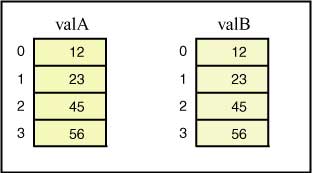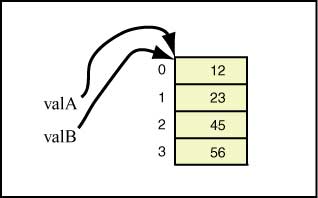Copying Values in Slots
In this example, the int in slot 0 of valA
is copied to slot 0 of valB,
and so on.
This is just like an assignment statement
spot = source
where both
variables are of primitive type int.
After the four assignment statements of the answer have executed,
each array contains the same values
in the same order:

The following statement does not do the same thing:
valB = valA ;
Remember that arrays are objects. The statement above will
merely copy the object reference in valA into the object
reference variable valB,
resulting in two ways to access the single array object:

The object that valB previously referenced is now lost
(it has become garbage.)
